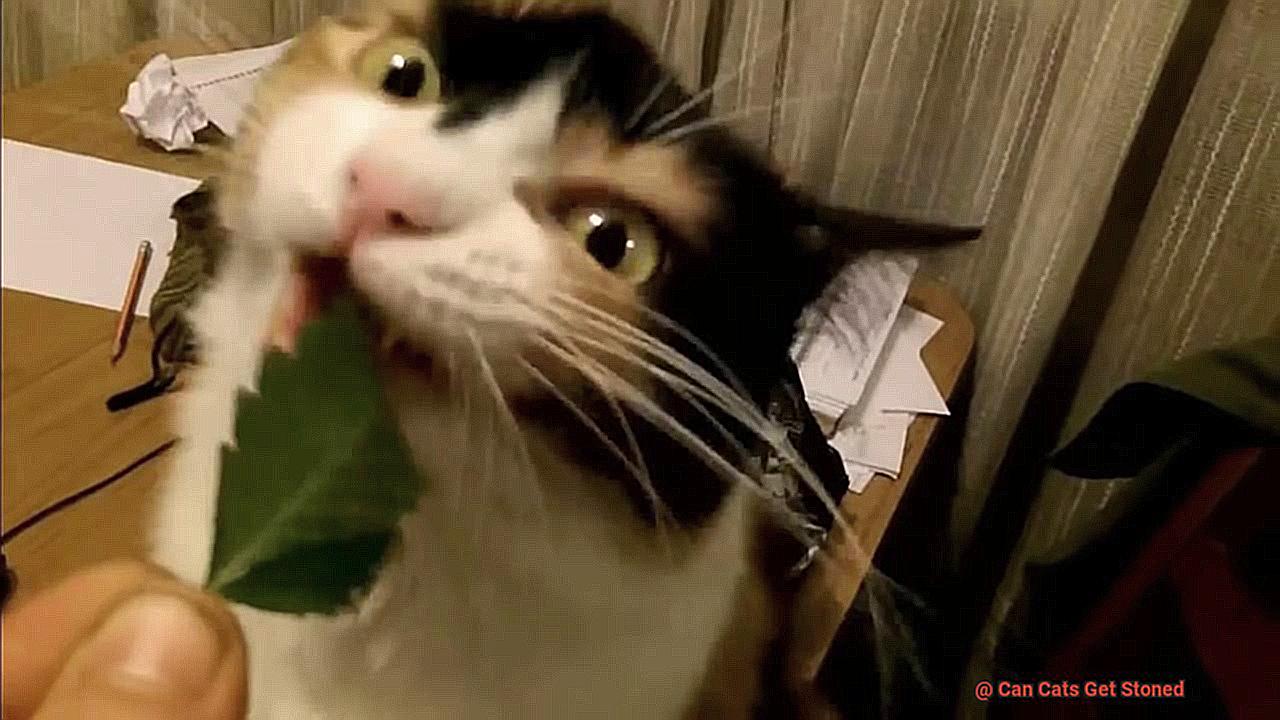Have you ever wondered if your furry feline friend can get stoned? Perhaps you’re a concerned cat parent who accidentally exposed your kitty to some marijuana smoke. Well, fear not. As an animal lover and researcher, I’ve been asked this question countless times, and the answer may surprise you.
Despite not being able to roll up a joint or hit a bong like their human counterparts, cats can still feel the effects of marijuana exposure. In fact, cats have a more active endocannabinoid system than humans, which makes them more sensitive to the compounds found in marijuana. This means that even small amounts of exposure to marijuana smoke or edibles can lead to alarming symptoms in your furry companion.
So, what exactly are these symptoms? How do you tell if your cat is high? And what should you do if you suspect that your cat has been exposed to marijuana? In this blog post, we’ll dive deeper into the effects of cannabis on cats and provide answers to all these questions and more.
We’ll also debunk some common misconceptions surrounding cats and cannabis, such as whether CBD oil is safe for your cat and if catnip is a type of marijuana. So sit tight and get ready to learn about the fascinating world of cats and cannabis – it’s going to be quite the ride.
What is the Endocannabinoid System?
It’s a truly remarkable cell-signaling system that regulates a variety of physiological functions, including pain, appetite, mood, and immune function. The ECS is made up of three primary components: endocannabinoids, receptors, and enzymes.

Endocannabinoids are molecules produced naturally by the body, which bear a striking resemblance to the cannabinoids found in cannabis. These molecules bind to cannabinoid receptors found throughout the body, including in the brain, organs, and immune cells. There are two main types of cannabinoid receptors: CB1 and CBCB1 receptors are primarily located in the brain and central nervous system and are responsible for regulating mood, appetite, and pain sensation. On the other hand, CB2 receptors are mainly found in the immune system and peripheral tissues and play a crucial role in inflammation and immune function.
The enzymes responsible for breaking down endocannabinoids are fatty acid amide hydrolase (FAAH) and monoacylglycerol lipase (MAGL). These enzymes ensure that the endocannabinoids are only active when necessary and prevent overstimulation of the ECS.
But what about our feline friends? Do they possess an ECS like humans do? The answer is a resounding yes. Cats have a similar ECS to humans, which means they have receptors that interact with cannabinoids like THC. However, cats are much more sensitive to THC than humans are, and even small amounts can have harmful effects on their health.
If you suspect that your cat has ingested THC, it’s important to seek veterinary care immediately. Some of the symptoms of cannabis toxicity in cats include lethargy, disorientation, loss of balance, hypersensitivity to sound and light, dilated pupils, and an increased heart rate. In severe cases, cats may experience seizures or even a coma.
It’s important to note that intentionally giving your cat THC is never recommended and can be considered animal abuse in some cases. While some pet owners may be tempted to give their cats cannabis products for medicinal purposes, there is limited research on the effects of cannabis on cats. Additionally, cats lack certain liver enzymes necessary for breaking down THC, which can lead to prolonged effects and potential harm.
Are Cats Sensitive to THC?
While cats can indeed get stoned from THC, they are much more sensitive to this substance than humans. Even a small amount of THC can have serious effects on their behavior and overall health.
Be aware of the symptoms of THC toxicity in cats, such as lethargy, loss of coordination, dilated pupils, increased heart rate, and agitation. In severe cases, cats may experience seizures or even coma. THC toxicity can be fatal in some cases, especially if your cat ingests a large amount of THC or if they have an underlying health condition.
To keep your beloved furry friend safe, it’s crucial to keep all cannabis products out of reach of pets and avoid smoking or vaping around them. If you suspect that your cat has ingested THC, seek veterinary care immediately. Your veterinarian may be able to induce vomiting or provide other treatments to reduce the effects of THC toxicity.
It’s essential to note that intentionally giving your cat THC is never recommended and can be considered animal abuse. As much as we love our pets, we must remember that they are not human and cannot handle certain substances in the same way that we can.
Symptoms of a Stoned Cat
However, even a small amount of THC can have serious effects on cats. It’s important to know the symptoms of a stoned cat and how to prevent accidental exposure.
Typical symptoms of a stoned cat can include lethargy, dilated pupils, lack of coordination, increased appetite, and vocalization. Some cats may also experience anxiety, paranoia, and agitation. While these signs may not seem alarming at first, it’s essential to seek veterinary attention immediately if you notice any concerning symptoms in your cat.
It’s worth noting that some substances, such as marijuana, can be toxic to cats and cause more severe symptoms like tremors, seizures, and coma. That’s why it’s crucial to keep all cannabis products out of reach of pets and to be mindful of any potential exposure. Accidental ingestion can occur through secondhand smoke or ingestion of edibles left within reach.
Intentionally Giving your Cat THC
However, some people may be tempted to give their cats THC or other forms of marijuana in an attempt to calm them down or alleviate medical issues. This act is not only dangerous but also highly irresponsible.
Cats are much smaller than humans, which means that even a small amount of THC can have devastating effects on their bodies. THC affects the same receptors in cats’ brains as it does in humans, but because their bodies are smaller, the impact can be much more intense. Your furry friend may experience negative side effects such as lethargy, disorientation, loss of coordination, and even seizures.
Apart from the immediate risks associated with giving cats THC, there are also long-term risks to consider. Regular exposure to THC can lead to liver damage and other health issues. It can also contribute to behavioral problems and make it harder for cats to learn new things or respond appropriately to their environment.
If you suspect that your cat has ingested THC, it’s crucial to seek veterinary attention right away. Your vet can provide supportive care to help your cat recover from the effects of the drug and monitor for any longer-term issues that may arise.
The best way to keep your cat safe and healthy is by avoiding giving them any form of marijuana or other illicit substances. Stick to safe and proven treatments for medical issues, and work with your vet to develop a comprehensive care plan that meets your cat’s unique needs.
Accidental Ingestion of THC
Cats are naturally curious creatures and may accidentally ingest products containing THC, such as edibles or marijuana plants.

If your cat ingests THC, it can lead to several adverse symptoms, including lethargy, disorientation, wobbliness, vomiting, diarrhea, and an increased heart rate. In severe cases, THC ingestion can even cause respiratory depression, seizures, and coma. That’s why it’s essential to immediately seek veterinary care if you suspect that your cat has ingested THC.
Cats are more susceptible to the harmful effects of THC than dogs because of their smaller size and unique metabolism. THC metabolizes slowly in cats, meaning it can stay in their system longer and cause prolonged effects. Additionally, cats lack certain liver enzymes that help metabolize THC, making them more sensitive to its effects.
To prevent accidental ingestion of THC, keep cannabis products out of reach of your pets. It’s also important to dispose of any leftover edibles or cannabis plants properly. If you have a curious cat who likes to wander around the house and explore new things, investing in child-proof containers for your cannabis products is a wise decision.
yF9IMIDgtaY” >
Veterinary Care for Cats Who Have Ingested THC
While it may seem amusing to see a cat get stoned, the reality is that accidental ingestion of THC can lead to serious and potentially life-threatening symptoms.
Cats are particularly vulnerable to the harmful effects of THC due to their smaller size and unique metabolism. Therefore, it is crucial for pet owners to take precautions and keep cannabis products out of reach in child-proof containers.
If you do suspect your cat has ingested THC, do not hesitate to seek veterinary care. The symptoms of ingestion include loss of coordination, lethargy, vomiting, and increased heart rate, which can progress to seizures and coma in severe cases.
When you take your cat to the veterinarian, they will likely induce vomiting to remove any remaining THC from the stomach. They may also use activated charcoal to help absorb any remaining THC in the digestive tract. In some cases, the cat may need to be hospitalized for closer monitoring and supportive care.
It’s important to note that veterinary care can be expensive, which is why prevention is always the best approach. Keep any marijuana products out of reach of pets and stored securely in a location that your furry friend cannot access.
Also Read: Are Mushrooms Bad For Cats?
Conclusion
In conclusion, it’s important to remember that cats can indeed get stoned from exposure to marijuana. Due to their highly active endocannabinoid system, they are more sensitive to the compounds found in marijuana than humans. Even a small amount of exposure to marijuana smoke or edibles can lead to alarming symptoms in your furry companion. These symptoms include lethargy, disorientation, loss of balance, hypersensitivity to sound and light, dilated pupils, and an increased heart rate. In severe cases, cats may experience seizures or even a coma.
It’s crucial to note that intentionally giving your cat THC is never recommended and can be considered animal abuse. While some pet owners may consider giving their cats cannabis products for medicinal purposes, there is limited research on the effects of cannabis on cats. Additionally, cats lack certain liver enzymes necessary for breaking down THC which can lead to prolonged effects and potential harm.
To keep your beloved furry friend safe, it’s important to keep all cannabis products out of reach of pets and avoid smoking or vaping around them. If you suspect that your cat has ingested THC by accident, seek veterinary care immediately. Your veterinarian may be able to induce vomiting or provide other treatments to reduce the effects of THC toxicity.
The best way to ensure the safety and health of your feline friend is by avoiding giving them any form of marijuana or other illicit substances altogether. Stick with safe and proven treatments for medical issues and work with your vet to develop a comprehensive care plan tailored specifically for your cat’s unique needs.







